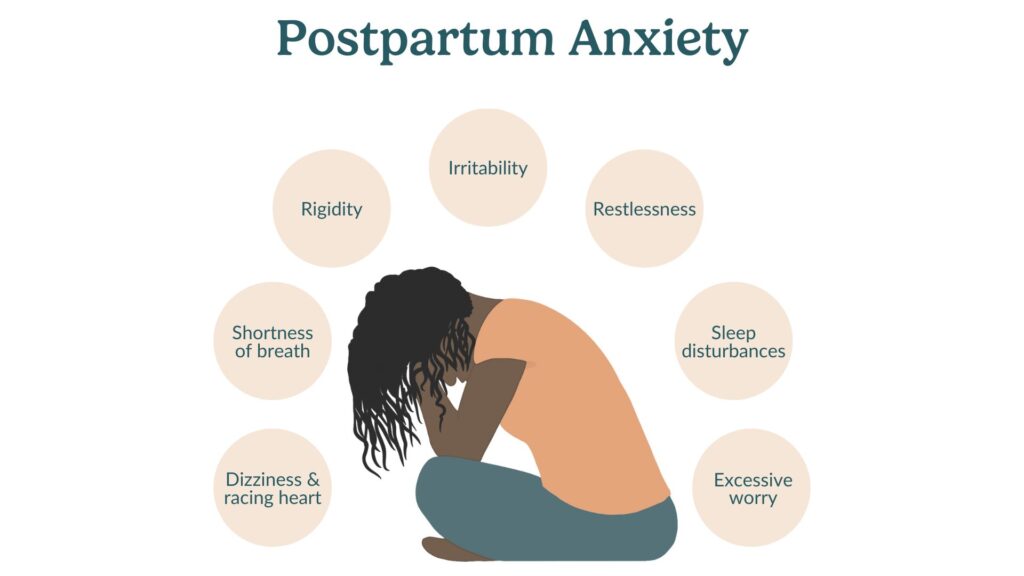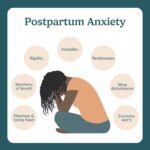postpartum anxiety

Postpartum anxiety
Postpartum anxiety is a condition characterized by excessive worry, fear, and anxiety following childbirth. It can occur on its own or alongside postpartum depression.
Recognizing and managing postpartum anxiety is important for your well-being and ability to care for your baby.
What to watch out for
It’s important to recognize the signs of postpartum anxiety and understand how to manage it. Here are some indicators and tips:
- Excessive worry: Feeling constantly worried or fearful about your baby's health, your ability to care for your baby, or other aspects of your life.
- Irritability: Becoming easily frustrated or angry, often over small things.
- Restlessness: Feeling unable to relax, with a constant sense of being on edge.
- Sleep disturbances: Having trouble falling asleep or staying asleep, even when your baby is sleeping.
- Physical symptoms: Experiencing physical symptoms such as a racing heart, dizziness, or shortness of breath.
- Intrusive thoughts: Having unwanted, disturbing thoughts about harm coming to your baby or yourself.
- Rigidity: Feeling restless, uptight, or obsessive over baby’s sleep schedule, eating habits, behaviors, etc.
To manage postpartum anxiety, consider these tips:
- Seek professional help: Consult a healthcare provider or mental health professional. Treatment may include therapy, medication, or a combination of both.
- Practice relaxation techniques: Engage in activities such as deep breathing, meditation, or yoga to help reduce anxiety.
- Exercise: Regular physical activity can help reduce stress and improve your mood.
- Connect with others: Talk to friends, family, or join a support group for new mamas to share experiences and receive support.
- Take breaks: Allow yourself time to rest and recharge. Ask for help with baby care and household tasks when needed.
If your symptoms persist or interfere with your daily life, it’s important to seek help from a healthcare provider.
Physical limitations or health circumstances
Certain conditions can increase the likelihood of experiencing postpartum anxiety:
- Previous anxiety or depression: A history of anxiety or depression increases the risk of postpartum anxiety.
- Lack of support: Limited support from family or friends can contribute to feelings of isolation and anxiety.
- Stressful life events: Major life changes or stressors, such as financial difficulties or relationship problems, can trigger postpartum anxiety.
- Complications during childbirth: Difficult labor, delivery, or health issues in the baby can increase stress and risk for postpartum anxiety.
If you have any of these risk factors, working with a healthcare provider can help you develop a plan to manage and reduce the risk of postpartum anxiety.
Breastfeeding and postpartum anxiety
Breastfeeding can sometimes be challenging for mamas experiencing postpartum anxiety. Here are some tips to help manage breastfeeding during this time:
- Seek support from an IBCLC: An International Board Certified Lactation Consultant (IBCLC) can provide personalized advice and support to help you with breastfeeding challenges.
- Monitor your mental health: Keep track of your anxiety levels and seek help if you notice an increase in symptoms.
- Practice self-care: Ensure you are taking care of your physical and mental health. Rest when you can, eat a nutritious diet, and ask for help from family and friends.
- Use nipple balm: We advise against using lanolin-based creams; use “nipple balms” instead. Breastfeeding should not be painful.
Other terms
Understanding related terms can help you better manage postpartum anxiety and related challenges:
- Postpartum depression: A more severe and long-lasting form of depression that can occur after childbirth and may coexist with anxiety.
- Intrusive thoughts: Unwanted, disturbing thoughts that can cause significant distress.
- Therapy: Professional counseling that can help address mental health issues like postpartum anxiety.
- Medication: Prescribed drugs that can help manage symptoms of anxiety and depression.
- Support system: Family, friends, and professionals who can provide emotional and practical support during the postpartum period.
For more information and support, you can visit:


